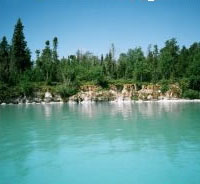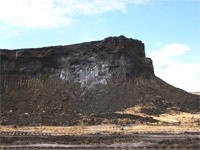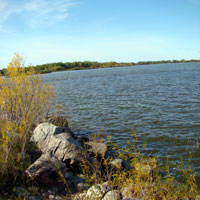
News |
- Coordinate Climate Policies in Canada says Conference Board
- Little Limestone Protected Area Finalized
- International Stop the Tar Sands Day Spreads Global Awareness
- Third Time The Charm? Climate Bill Re-introduced
- Save Lake Winnipeg Act Receives Royal Assent
- Poplar River Traditional Area Permanent Protection
- Legal Review of Manitoba's "No Logging in Parks" Act
- Province Subsidizes Tim Horton Youth Camp
- First Nations Demand Hydro Review
- Rio +20 Earth Summit Less Than A Year Away
- Eco-Justice Awarded $80,000, DFO Appeals
- Faith Based Leaders Unite for Planet
| Coordinate Climate Policies in Canada says Conference Board | 9 July 11 |
 The federal and provincial governments of Canada have developed a hodgepodge of strategies for cutting carbon emissions that do not mesh with each other and are ultimately an inefficient way to tackle climate change, says a new report by the Conference Board of Canada entitled, Greenhouse Gas Mitigation in Canada.
The federal and provincial governments of Canada have developed a hodgepodge of strategies for cutting carbon emissions that do not mesh with each other and are ultimately an inefficient way to tackle climate change, says a new report by the Conference Board of Canada entitled, Greenhouse Gas Mitigation in Canada."Without an accelerated pace of climate policy action, Canadian governments are unlikely to meet their own targets," said Len Coad, Conference Board of Canada director of energy, environmental and technology policy. "Not only is policy coordination among governments more likely to reduce emissions at a lower cost, it would help governments to learn from the practices of others." The conference Board report notes each province has set a 2020 target for emission reductions, but action will have to accelerate or objectives will be missed. A national target of a 17% reduction by 2020 (from a 2005 baseline) and the individual provincial targets are being addressed through a complex, diverse, and opaque mix of instruments and programs. The report calls for carbon pricing - in the form of cap-and-trade mechanisms or a carbon tax - as an instrument to better coordinate policies. "A co-ordinated and broad initiative on carbon pricing could contribute to efficiency by providing a single market with a single set of requirements for participation, as well as a greater volume of trading to improve liquidity and establish a price for carbon that reflects a larger market," states the report. View June 3, 2011 Calgary Herald articleView June 1, 2011 Globe and Mail article View June 1, 2011 iPolitics article View June 1, 2011 Conference Board of Canada press release View Conference Board of Canada, June 2011 Greenhouse Gas Mitigation in Canada Source:
Conference Board of Canada
|
|
 Print version Print version |
Top |
| Little Limestone Protected Area Finalized | 1 July 11 |
 Manitoba announced permanent establishment of the 4,810 hectare Little Limestone Lake Provincial Park June 24, 2011.
Manitoba announced permanent establishment of the 4,810 hectare Little Limestone Lake Provincial Park June 24, 2011.The newly designated provincial park was first designated and protected as a park reserve July 2007. Crown mineral rights were withdrawn at that time also. The park includes Little Limestone Lake, islands in the lake, and a 100-metre wide strip along the south, west, and northern shorelines. Park reserves can provide interim protection while the designation is considered for permanent protection and provincial park status. Little Limestone Lake is the worlds largest marl lake, located near the northwest corner of Lake Winnipeg, 450 kilometres north of Winnipeg, and 65 kilometres north of the community of Grand Rapids, adjacent to Mosakahiken Cree Nation Reserve. Marl lakes turn from clear to an opaque turquoise or even a milky blue-white in warm summer weather, when calcite increases. Manitoba Conservation solicited public input on Little Limestone Park Reserve between July 15 and August 31 2010. Manitoba Wildlands submitted comments highlighting: the inadequacy of a 100 m buffer zone around the lake, lack of classification in Manitoba's Parks Act for water, and inadequate or non-existent consultation and public review standards. View June 24, 2011 Manitoba Government press releaseView June 24, 2011 CBC News article View June 25, 2011 Winnipeg Free Press article View Government of Manitoba: Department of Conservation, "Little Limestone Provincial Park" factsheet (PDF) View August 30, 2011 Manitoba Wildlands Comments "Little Limestone Lake Provincial Park Proposal" (PDF) View Manitoba Wildlands Protected Areas Announcements page Source:
Government of Manitoba
|
|
 Print version Print version |
Top |
| International Stop the Tar Sands Day Spreads Global Awareness | 1 July 11 |
 The International Stop the Tar Sands Day, June 18th, 2011, inspired people around the world to organize, educate and mobilize civil society to stop Alberta’s destructive tar sands industry.
The International Stop the Tar Sands Day, June 18th, 2011, inspired people around the world to organize, educate and mobilize civil society to stop Alberta’s destructive tar sands industry."No values-driven company wants its products delivered with fuel that exacerbates climate change, poisons local communities, destroys forests, and kills wildlife," said Todd Paglia of ForestEthics. In London, England, people gathered at the Canadian High Commission to highlight Britain's shameful involvement in the world's largest and dirtiest industrial project. In London, Ontario they hosted a car-free day and a ‘oily’ zombie undead walk as a creative means of bringing awareness to the destruction of the Alberta tar sands. On the steps of the Alberta Legislature, where many of the decisions are made about tar sands expansion , a rally showed the Albertan government the follies of unabated and irresponsible management and support of the tar sands in Alberta. All across the globe, people stood up and said NO to the dirty tar sands fossil fuel developments. Tar Sands Day events were held around the world including: 12 Canadian cities, 25 cities across the Unites States, 20 countries across Europe, with events being held as far away as Nigeria, New Zealand and Australia. View June 22, 2011 Public Service Europe articleView June 20, 2011 Greenpeace International blog post View June 20, 2011 EcoSanity video links of “International Tar Sands Day of Action” View June 20, 2011 Procurement Leaders article View June 19, 2011 The Media Co-op article View June 19, 2011 Green Answers article View June 18, 2011 Demotix article Source:
Greenpeace, Procurement Leaders
|
|
 Print version Print version |
Top |
| Third Time The Charm? Climate Bill Re-introduced | 1 July 11 |
 The New Democratic Party (NDP) has re-introduced the Climate Change Accountability Act to the House of Commons for the third time. The bill has passed third reading in Parliament twice, but has yet to get through the unelected and appointed Canadian Senate.
The New Democratic Party (NDP) has re-introduced the Climate Change Accountability Act to the House of Commons for the third time. The bill has passed third reading in Parliament twice, but has yet to get through the unelected and appointed Canadian Senate.Bill C-377 was first introduced October 2006, and passed third reading 148 to 116 on June 4, 2008 with only the Conservatives voting against it. However, Bill C-377 died when Parliament was dissolved for the 2008 Canadian federal election. The Climate Change Accountability Act was re-introduced for first reading, this time as Bill C-311, on February 10, 2009. Bill C-311 passed third reading May 5, 2010 149 to 136, with once again only the Conservatives voting against the Bill. It received 1st Reading in the Senate May 6, 2010 and was debated several times before being defeated at 2nd Reading on November 16, 2010. It is very rare for the Canadian Senate, to overturn legislation passed by Canada’s elected Parliament. New Democrat Environment Critic Megan Leslie presented the Climate Change Accountability Act, now Bill C-224, June 15, 2011 in exactly the same form as when introduced in 2006. The Bill sets green house gas emission targets – it mandates a 25% reduction from 1990 levels by 2020, and an 80% reduction by 2050. "The Bill is important because it would provide a touchstone and a rallying point for Canadians concerned about the need for real science-based targets. It would help inform policy-makers about what needs to be done in taking a significant role in addressing climate change," said Leslie as she introduced the bill for its third round of first reading in Parliment on June 15, 2011. View June 21, 2011 Canadian Youth Climate CoalitionView June 15, 2011 Canadian House of Commons Debates View June 15, 2011 NDP press release View info on Private Members Bill: C-224 Source:
Canadian Youth Climate Coalition
|
|
 Print version Print version |
Top |
| Save Lake Winnipeg Act Receives Royal Assent | 25 June 11 |
 "The Save Lake Winnipeg Act" introduced by the Manitoba Government just before the Legislative Session closed June 2, 2011, received third reading June 16, 2011. The act received royal assent and was proclaimed into law on the same day.
"The Save Lake Winnipeg Act" introduced by the Manitoba Government just before the Legislative Session closed June 2, 2011, received third reading June 16, 2011. The act received royal assent and was proclaimed into law on the same day.The new act will implement a number of initiatives, ranging from regulations about when, where and how much manure can be spread; regulation of wetlands; a temporary moratorium on permits or leases for peat and peat moss; submission of drinking water and wastewater management plans to the province by municipalities prior to development projects to ensure health and safety and environmental protection; and the modification of Winnipeg's North End Water Pollution Control Centre. A small amendment to include the words "biological nutrient removal" in the section referring to the City of Winnipeg's Water Pollution Control Centre was made at third reading The Legislative Committee met June 13th & 14th. While many presenters were supportive of the intentions of the act, many also highlighted that the act did not go far enough, was not comprehensive enough and/or these actions should have been taken years ago. Download Bill 46 – Presentations & Submissions to the Legislature View January 22, 2011 Interlake Spectator articleView January 17, 2011 Winnipeg Free Press article View January 13th, 2011 Transcript Legislative Assembly Of Manitoba Hansard: Standing Committee On Social And Economic Development View January 14th, 2011 Transcript Legislative Assembly Of Manitoba Hansard: Standing Committee On Social And Economic Development View previous June 11, 2011 Manitoba Wildlands news item View Legislative Assembly of Manitoba, Bill Status Fifth Session, Thirty-Ninth Legislature 2010-2011 (November 16, 2010 to June 16, 2011) (PDF) View Manitoba Wildlands Lake Winnipeg page Source:
Legislative Assembly of Manitoba
|
|
 Print version Print version |
Top |
| Poplar River Traditional Area Permanent Protection | 25 June 11 |
 Manitoba moved about 800,000 hectares of boreal forest and wetlands on the east side of Lake Winnipeg to permanent protection June 16, 2011.
Manitoba moved about 800,000 hectares of boreal forest and wetlands on the east side of Lake Winnipeg to permanent protection June 16, 2011.The protected traditional area first received protection under two Manitoba Acts in 1999, and is based on the lands plan submitted by Poplar River First Nation (PRFN) in 2005. The lands are located about 400 kilometres north east of Winnipeg. PRFN nominated the area, interim protection was first established in 1999, and was extended several times. The is the first time lands have been 'protected' by regulation under Manitoba's East Side Traditional Lands Planning and Special Protected Areas Act. Poplar River's protected traditional area to be part of the UNESCO World Heritage Site bid that goes to Canada for review in 2011, to be formally submitted in 2012. Five Ontario and Manitoba First Nations first entered into an accord for the future of their neighbouring lands in 2002. The accord indicates that world heritage site listing would be investigated by the communities. "The community resource use area, and the new road corridor are not protected lands, including because of dispositions issued for sand and gravel. Unfortunately the new East Side Road Authority road corridor will travel very close to the heart of these otherwise undisturbed boreal lands, and sacred areas. We hope restoration of the former winter road corridor occurs. Lands between the two corridors could also be at risk otherwise," stated Gaile Whelan Enns of Manitoba Wildlands. View June 21, 2011 Winnipeg Free Press articleView June 16, 2011 Government of Manitoba press release View June 16, 2011 Wilderness Committee Manitoba press release View June 16, 2011 CBC News article View January 4, 2011 Manitoba Wildlands news item View October 2, 2009 Manitoba Wildlands news item View April 2007 Manitoba Wildlands, From Poplar/Nanowin Rivers Park Reserve to: Poplar River First Nation Asatiwisipe Aki Protected Lands (PDF) View Asatiwisipe Aki Traditional Use Planning Area Regulation View Asatiwisipe Aki Management Plan, Final Draft (PDF) View Asatiwisipe Aki Traditional Territory Zoning Plan (PDF) View Manitoba Wildlands Protected Areas Announcements page Source:
Government of Manitoba, Manitoba Wildlands
|
|
 Print version Print version |
Top |
| Legal Review of Manitoba's "No Logging in Parks" Act | 25 June 11 |
 The Wilderness Committee, with supporting affidavits from Manitoba Wildlands, filed a legal application for a Queens Bench Rule 14.05 Review June 20, 2011. The legal review is to clarify legal interpretation of the ban on logging in Manitoba provincial parks.
The Wilderness Committee, with supporting affidavits from Manitoba Wildlands, filed a legal application for a Queens Bench Rule 14.05 Review June 20, 2011. The legal review is to clarify legal interpretation of the ban on logging in Manitoba provincial parks.In June 2009 the Manitoba Government enacted Bill-3: The Forest Amendment Act, which amended The Provincial Parks Act and The Forest Act of Manitoba to prohibit logging in provincial parks. But in 2009, the government issued a license to Tolko to build a logging road across Grass River Provincial Park , which was finalized, after appeals, in February 2011. Manitoba Wildlands and the Wilderness Committee appealed the Environment Act license September 2009, but the appeals were dismissed. The rule review is to obtain legal interpretation of the 2009 amendments to The Provincial Parks Act and The Forest Act. "We are asking a judge to give us a legal definition: is a logging road considered logging or not?" said Eric Reder, campaign director, Manitoba Wilderness Committee. "Manitobans love their parks, and they want their government to do more to protect the parks we have and to expand our protected areas network in our boreal regions. This government needs to admit that these 'no logging' zones need restoration and are not protected!" said Manitoba Wildlands director Gaile Whelan-Enns. View June 20, 2011 Wilderness Committee/Manitoba Wildlands press releaseView June 20, 2011 Winnipeg Free Press article View June 20, 2011 CJOB 680AM coverage View June 20, 2011 Wilderness Committee website posting View August 12, 2009, Environment Act License No. 2896 View Manitoba Wildlands Forests page Source:
Wilderness Committee
|
|
 Print version Print version |
Top |
| Province Subsidizes Tim Horton Youth Camp | 18 June 11 |
 The Province of Manitoba is contributing $1.8 million to Tim Horton Children’s Foundation (Foundation) to assist with construction of a road, telephone, and electrical services to the new youth leadership camp near Sylvia Lake in Whiteshell Provincial Park, Manitoba.
The Province of Manitoba is contributing $1.8 million to Tim Horton Children’s Foundation (Foundation) to assist with construction of a road, telephone, and electrical services to the new youth leadership camp near Sylvia Lake in Whiteshell Provincial Park, Manitoba.In 2010 the foundation received $24 million in gross revenue, with a $2.5 million surplus. Foundation revenue is garnered primarily from donation boxes at Tim Hortons locations, and coffee sales revenues from Tim Hortons annual “Camp Day”. The camp is expected to host 3,800 people annually, during peak season (June-September) most summer visitors will be leadership graduates from outside of Manitoba, with Manitoban groups having access in the winter. The Sylvia Lake camp in Manitoba will be the Foundation's seventh camp. Total cost of the Sylvia Lake camp is estimated to be $12 million. The Foundation presently has six other camps across North America. It is the Foundation's first camp inside a provincial park. The Whiteshell Provincial Park does not have a management plan as required under Manitoba's Provincial Parks Act. Initially the Foundation intended to construct a camp near Meditation Lake, also in Whiteshell Park, but changed locations to near Sylvia Lake following public outrage and concerns over water quality near Meditation Lake. The camp near Sylvia Lake received an environmental license May 19, 2011. Manitoba Wildlands, along with others, submitted comments during the licensing process in winter 2010. Construction is expected to begin in the spring of 2012 to open summer 2013. “Our province looks forward to a strong partnership with Tim Hortons to help deserving young people gain valuable life skills and leadership experience,” said Manitoba Premier Greg Selinger. View June 1, 2011 CBC News articleView June 1, 2011 Government of Manitoba Press Release View Manitob Public Registry (#5493) -Tim Horton Children's Foundation Youth Leadership Camp View Tim Horton's Children Foundation, 2010 Year in Review (PDF) View Manitoba Wildlands, Comments: Tim Horton Children's Foundation Youth Leadership Camp in Whiteshell Provincial Park at Sylvia Lake (PDF)  View Manitoba Wildlands Protected Areas/Parks Reviews page Source:
Government of Manitoba
|
|
 Print version Print version |
Top |
| First Nations Demand Hydro Review | 18 June 11 |
 Manitoba First Nations have taken their plea for an independent review of Manitoba Hydro's impact on flooding all the way to the United Nations.
Manitoba First Nations have taken their plea for an independent review of Manitoba Hydro's impact on flooding all the way to the United Nations.Glenn Hudson, chief of flood-ravaged Peguis First Nation, and Southern Chiefs Organization Grand Chief Morris Shannacappo argue recent flooding is the result of artificially high water levels created on Lake Manitoba and several rivers due to Manitoba Hydro's regulation of lake levels for use as hydro-reservoirs. They were in New York City in May 2011 at the United Nations 10th Session of the Permanent Forum on Indigenous Issues. They met with UN aboriginal and legal bodies to seek funding for impact studies on damage caused by artificially increasing lake levels. Shannacappo addressed the general assembly calling for an environmental audit into Manitoba Hydro practices. "All they're thinking about is their money-making machine in Manitoba Hydro," said Shannacappo. Flooding in 2011 has forced approximately 1,400 people from their homes on southern First Nations such as Peguis, Lake St. Martin and Dauphin River. Peguis has experienced four floods since 2009. In 2011 nearly 900 people were evacuated from the community, and nearing end of May 2011, more than half had still not returned home. "We want to force this issue, because we're seeing the impacts of Hydro's practices," Hudson said. View May 21, 2011 Intertribal Times articleView May 20, 2011 Winnipeg Free Press article View May 19, 2011 Winnipeg Sun article View Southern Chiefs Organization View Peguis First Nation View United Nations 10th Session of the Permanent Forum on Indigenous Issues View Manitoba Wildlands Aboriginal Court Cases & Consultations Source:
Winnipeg Sun, Winnipeg Free Press
|
|
 Print version Print version |
Top |
| Rio +20 Earth Summit Less Than A Year Away | 18 June 11 |
 Heads of state, diplomats, and other world leaders will get together for the twentieth United Nations Conference on Environment and Development, also known as the Earth Summit, June 4-6th, 2012 in Rio De Janeiro, Brazil.
Heads of state, diplomats, and other world leaders will get together for the twentieth United Nations Conference on Environment and Development, also known as the Earth Summit, June 4-6th, 2012 in Rio De Janeiro, Brazil.The first Earth Summit, took place in Rio de Janeiro June 1992. The Rio Declaration on Environment and Development, Agenda 21, Convention on Biological Diversity, Forest Principles and the Framework Convention on Climate Change came out of the 1992 Earth Summit. The objectives of the Rio +20 Summit are: to secure renewed political commitment to sustainable development; to assess progress towards internationally agreed goals on sustainable development, and to address new and emerging challenges. The Summit will also focus on two themes: a green economy in the context of poverty eradication and sustainable development; and an institutional framework for sustainable development. Manitoba Wildlands will be providing selected and recommended links for news, reports, and analysis regarding the Rio +20 UN Earth Summit. For more information: View United Nations Conference on Sustainable Development (2012 - Rio +2)View UN Conference, United Nations Conference on Environment and Development (1992) View June 4, 2011 Greenpeace blog post Source:
United Nations Conference on Sustainable Development
|
|
 Print version Print version |
Top |
| Eco-Justice Awarded $80,000, DFO Appeals | 18 June 11 |
 Nine conservation groups, represented by Eco-justice, won a landmark decision in December 7, 2010 that Department of Fisheries and Oceans (DFO) failed to adequately protect critical habitat of B.C. resident killer whales. In addition, Judge James Russell awarded $80,00 in legal costs to Eco-justice April 26, 2011. It is rare that costs are awarded in public interest lawsuits, but Justice Russell penalized DFO for its "reprehensible, scandalous or improper conduct" in attempting "...to thwart the applicants' attempts to bring important public issues before the court."
Nine conservation groups, represented by Eco-justice, won a landmark decision in December 7, 2010 that Department of Fisheries and Oceans (DFO) failed to adequately protect critical habitat of B.C. resident killer whales. In addition, Judge James Russell awarded $80,00 in legal costs to Eco-justice April 26, 2011. It is rare that costs are awarded in public interest lawsuits, but Justice Russell penalized DFO for its "reprehensible, scandalous or improper conduct" in attempting "...to thwart the applicants' attempts to bring important public issues before the court."Once a species is listed under the Species at Risk Act, the government is required to identify the habitat the species needs to survive and recover. For the killer whale, DFO first issued a Protection Statement claiming that existing laws, and the exercise of government discretion were enough. The Federal Court disagreed. "The court ruled that discretionary laws, such as the Fisheries Act, do not sufficiently protect critical habitat of these endangered species," said Keith Ferguson, Ecojustice staff lawyer. The win ensures stronger legal protection for all of Canada's 90 marine species that are at risk of extinction, but DFO has appealed the decision. "We're not backing down," said Christianne Wilhelmson, executive director of the Georgia Strait Alliance one of the nine groups represented by eco-justice, after being notified that DFO had appealed the decision in June 2011. "DFO would rather waste its time in court instead of focusing its energy and taxpayer money on protecting habitat for at-risk species that urgently need help to survive and recover," Wilhelmson added. "DFO is trying to limit the power of the Species at Risk Act, which intends to provide mandatory protection for at-risk species,"added Feguson. View June 17, 2011 Sierra Club, BC press releaseView May 2011 Sierra Club, BC webpage View April 29, 2011 Courier Islander article View April 26, 2011 Vancouver Sun article View April 26, 2011 Federal Court Decision (PDF) View December 7, 2010 Federal Court Decision (PDF) View Manitoba Wildlands Biodiversity & Species page Source:
Sierra Club, BC
|
|
 Print version Print version |
Top |
| Faith Based Leaders Unite for Planet | 18 June 11 |
 A growing and diverse number of faith based leaders around the globe who are coming together to tackle the ecological challenges faced by humanity.
A growing and diverse number of faith based leaders around the globe who are coming together to tackle the ecological challenges faced by humanity."Our desire to consume everything of value, to extract every precious stone, every drop of oil and every creature from the sea knows no bounds. This quest for profit subverts our present and our future," stated Archbishop Desmond Tutu, speaking at World Wildlife Fund 's 50th Anniversary April 29, 2011. Faith leaders gathered at the UN complex in Nairobi, Kenya. "We call on you to refute the myth that action to cut emissions is too expensive, when it is cheaper than the long term costs on inaction," said the faith-based leaders in a June 8, 2011 statement. They also issued a wide range of recommendations for world leaders to set binding targets for phasing out fossil fuels, and reduction of greenhouse gas emissions less than one degree centigrade, as a measure of slowing down global warming. The B.C.-Yukon division of KAIROS, a long-established ecumenical Candian Christian development organization brought together fifty Christian, Hindi, Jewish, and Buddhist faith-based leaders together to urge B.C. Premier Christy Clark and Opposition leader Adrian Dix to balance profit with sustainability in handling B.C.'s natural wonders. Monks and rabbis stood alongside Catholics and Anglicans in Canberra, Australia June 2, 2011 in support of the Australian government's plan to tackle climate change, which includes a carbon tax. "This isn't actually an issue as to whether one believes in God or not or how one believes in God," said Rabbi Jeffery Kamins, adding that combating climate change was a moral imperative no matter what religious beliefs people held. View June 9, 2011 Anglican Journal articleView June 2, 2011 Sydney Morning Herald article View May 11, 2011 Vancouver Sun article View April 29, 2011 World Wildlife Fund press release Source:
Sydney Morning Herald, WWF, Anglican Journal
|
|
 Print version Print version |
Top |


 RSS Feeds:
RSS Feeds: